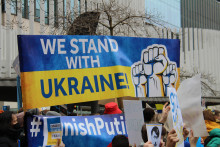Mykhailo Brytskyi (19) sat in his room for hours on February 24, the day of the Russian invasion. Listening to Ukrainian music. Later in the day, the Chemical Science & Engineering student decided to come to campus anyway. Dressed in traditional Ukrainian costume, the country's blue-and-yellow flag slung over his proud back. How is he doing a month later? 'Good, but my 'good' is different from your 'good'. It's strange how quickly Ukrainians now say they are doing well,' Brytskyi says. 'That's because I have friends who have it much tougher. A comrade asked his parents the other day how things were going and only got an answer two weeks later. Try to imagine that.'
Shelter
Brytskyi's parents are still in Kyiv. They hear bombings and gunfire every day, but live in a relatively quiet part of the metropolis. 'They haven't even been to the bomb shelter for days. It is very cold there and they feel relatively safe in their homes now. We are in touch on a daily basis. My parents want me to keep focusing on my studies.'

It's not easy for Brytskyi. 'But I don't have a backup, because for now I can't go back to Ukraine. Following the study programme well is my job. That's also what my family wants. I appreciate the support of fellow students and teachers who ask how I'm doing, but sometimes it's hard because I have to answer the same questions over and over again.'
 'Alive'
'Alive'
Viktoriia Konashchuk (19, pictured left), a Business Information Technology student, recognizes Brytskyi's description of answers to the question of how she is doing. 'It's very strange how quickly I got used to reality. Last week, I texted my parents in Kyiv how they had spent the night. They almost jokingly sent back 'alive'. We all accept it as a fact that it's war.' Konashchuk is relieved that the information flow in Kyiv is much better than it was during the first two weeks. 'Day by day my parents get updates on the situation. That way I also know daily how they are doing.'
Economics
The student finds it difficult to look ahead. Experts contradict each other daily about the war. 'The shortest scenario appeals to me the most. I notice that Ukrainian students from the UT community are also starting to worry about the collapsed economy. Many of us are still supported financially by parents. That is in danger of being in trouble.'
Brytskyi complements her: 'In Kyiv the damage is already enormous, but cities like Mariupol have been completely bombed out. Millions of people have been evacuated, but should the war stop, where will they go?'
It's going too far to say Ivanna Vasylkiv (19) is doing well, but the Chemical Science and Engineering student is doing better than she was four weeks ago. 'I have the relative good fortune that my family is in Kyiv, the most secure city in Ukraine. It helps to think as little as possible about the war and only take news about Kyiv to me. Everything else makes me anxious.'
Kyiv
Vasylkiv was spending her Christmas vacations still in Kyiv. 'It's hard to accept the facts. Kyiv is the place I love most and at the moment I can't go back home. I remember walking there in December and thinking about when I would be back in Kyiv. It feels very crazy that that can take a long time.'
What helps Vasylkiv is the tremendous engagement on campus. While flyering, in the lecture hall and with teachers: everywhere people show interest in her situation. 'That feels so good. That makes it bearable. The focus on my studies is not one hundred percent, but it is good enough. I am a freshman and want to pass this year no matter what. It doesn't benefit my family if I fail.'



 'Alive'
'Alive'



